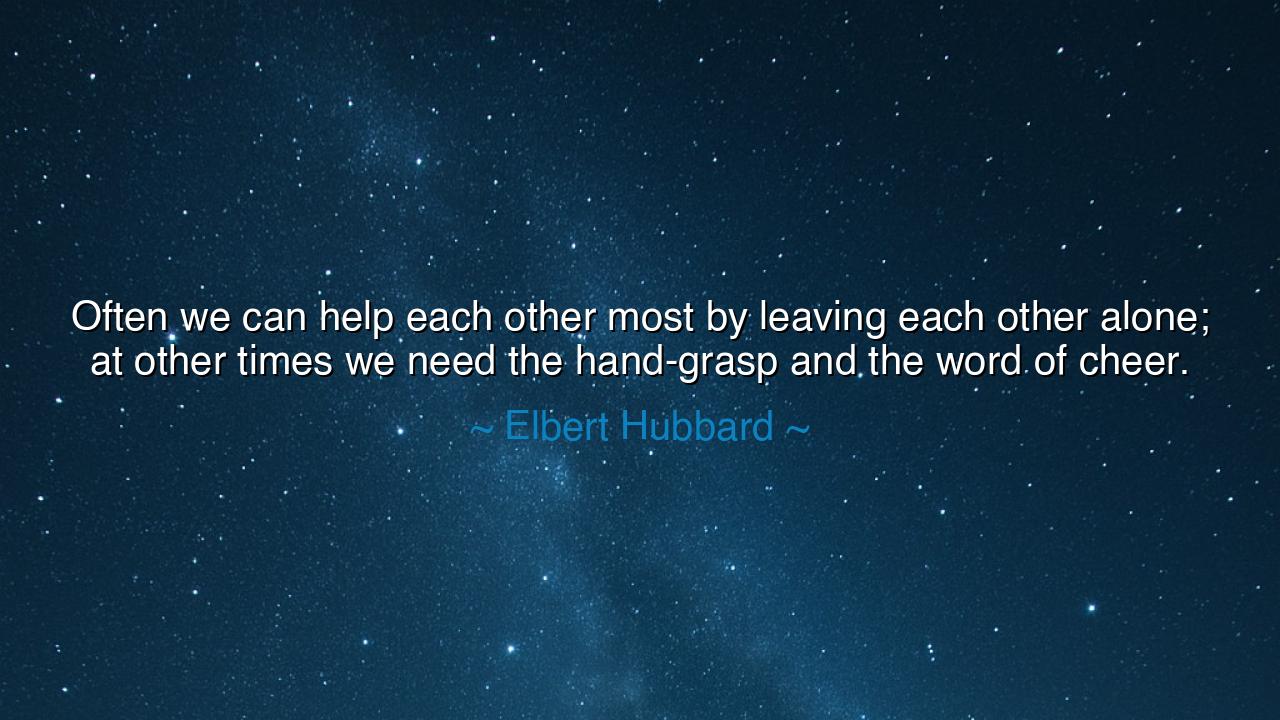
Often we can help each other most by leaving each other alone; at
Often we can help each other most by leaving each other alone; at other times we need the hand-grasp and the word of cheer.






In the tender yet wise words of Elbert Hubbard, philosopher of the heart and craftsman of the soul, we find a truth as ancient as the bond between human beings: “Often we can help each other most by leaving each other alone; at other times we need the hand-grasp and the word of cheer.” These words speak of the sacred balance between presence and distance, between action and restraint, between the touch that heals and the space that allows healing to unfold on its own. To know when to draw near and when to step back — that is one of the highest arts of love and wisdom.
The origin of this thought lies in Hubbard’s understanding of human nature — his belief that all souls must walk a portion of their path alone, yet none can survive entirely without the warmth of others. Living at the turn of the twentieth century, a time when industry and progress often overshadowed the gentler virtues, Hubbard sought to remind his generation that the greatest service we can render one another is not always to interfere, but to discern. There are times when comfort suffocates and silence saves; when to leave one alone is not abandonment, but respect — the recognition that growth, like the seed’s rising through the soil, requires solitude and struggle.
The ancients knew this wisdom well. The philosopher Lao Tzu wrote that the best leader is one whose presence is hardly felt, for he allows his people to flourish by their own strength. Likewise, the physician Hippocrates taught that sometimes the best cure is not more medicine, but the body’s own power to restore itself when undisturbed. So too in the realm of the spirit: sometimes, in our eagerness to help, we press too close, we speak too much, and we rob others of the chance to find their own strength. The wise do not rush to mend every silence or fill every tear — they know that certain wounds must breathe before they can heal.
And yet, Hubbard’s wisdom is not cold detachment, but compassionate timing. He reminds us that there are other moments — tender, fleeting, sacred — when the hand-grasp and the word of cheer are the very breath of life to the weary. There are souls who have fought alone for too long, who need not solitude but solace. To them, a single gesture of kindness becomes a bridge from despair to hope. The ancients told of Aeneas, who, after the fall of Troy, carried his father upon his back — not because the old man could not walk, but because the weight of love demanded it. So it is with us: sometimes to bear another’s burden is not to hinder their journey, but to help them find the will to walk again.
Consider the story of Abraham Lincoln and his secretary, John Hay. In the darkest days of the Civil War, when Lincoln bore the sorrows of a divided nation, Hay once asked how the President could carry such a weight. Lincoln answered softly, “I must bear it alone.” Yet on another night, after hearing of terrible loss, he called Hay to sit with him in silence. They spoke little, but that silent presence — that human nearness — gave Lincoln the strength to rise again. Thus, even the loneliest of leaders knew the dual truth of Hubbard’s words: that some burdens are solitary, but no soul can live without the warmth of companionship.
There is, then, a deep wisdom to this rhythm of closeness and distance — a dance of empathy and restraint. To truly help another, we must first learn to see them clearly: to sense when their spirit is calling for space, and when it cries out for touch. The unwise rush to act; the wise pause to perceive. For helping is not always doing, and love is not always speaking. Sometimes the truest love is silence, and sometimes the most powerful silence is broken by a single word: “I’m here.”
Therefore, my child, take this teaching into your heart: learn the discernment of compassion. When you see another in struggle, ask not, “How can I fix this?” but rather, “What does this soul need?” Sometimes the answer will be space — the freedom to fall, to learn, to rise. Sometimes the answer will be presence — the steady hand, the listening ear, the word that lifts. Be both gentle and wise, for love is not one motion but many, like the tides that ebb and flow upon the same eternal sea.
So let Elbert Hubbard’s words be a lamp in your dealings with others: “Often we can help each other most by leaving each other alone; at other times we need the hand-grasp and the word of cheer.” The key lies not in one or the other, but in the balance between them. To love well is to know when to withdraw and when to reach forth — when to stand aside like the watchful guardian, and when to kneel beside like the faithful friend. For in that balance, compassion becomes wisdom, and wisdom becomes love eternal.






AAdministratorAdministrator
Welcome, honored guests. Please leave a comment, we will respond soon